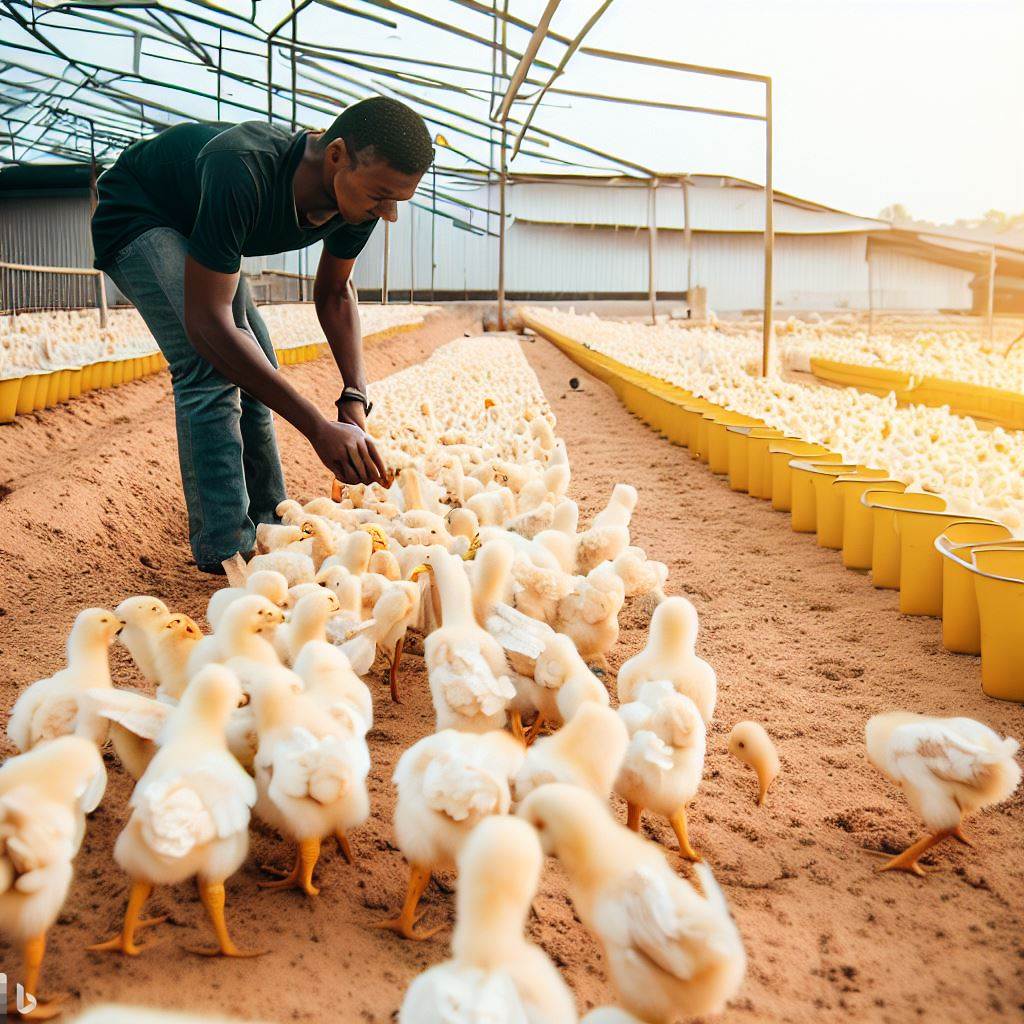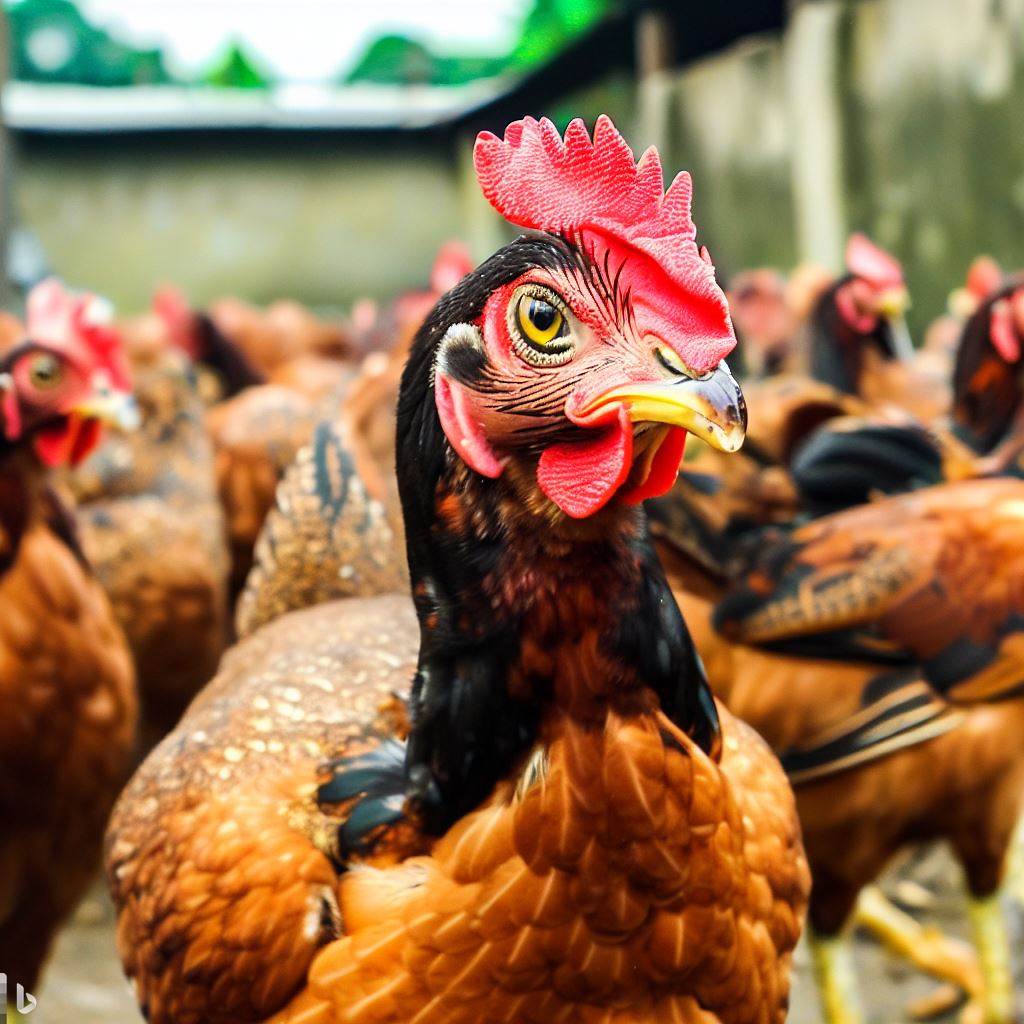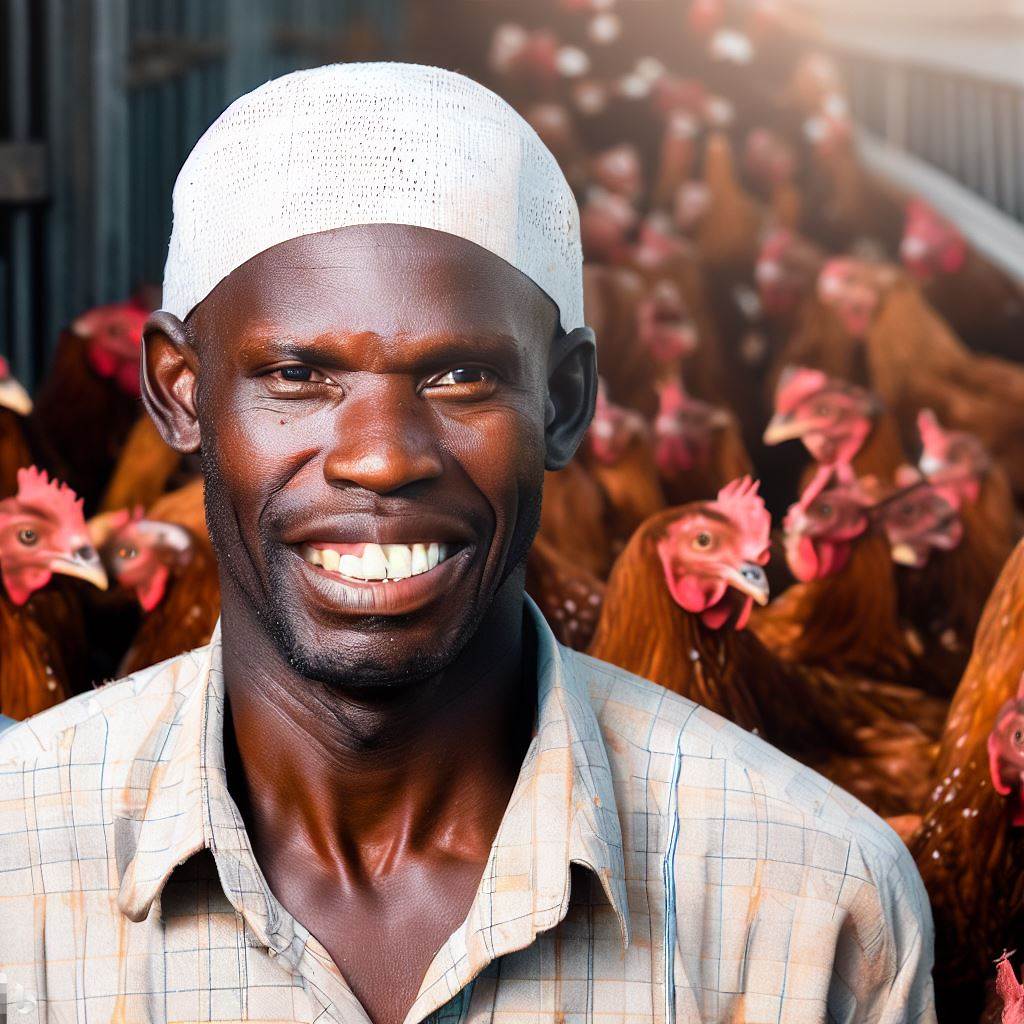Introduction
Are you considering launching a poultry farm in Nigeria? Poultry farming stands as a thriving sector, contributing substantially to income generation and job creation in the country.
This article offers a holistic manual on starting a poultry farm in Nigeria, furnishing essential steps and invaluable suggestions for achieving prosperity.
The opening grabs your attention by asking if you’re intrigued by establishing a poultry farm in Nigeria.
It then succinctly outlines the significance of poultry farming in the nation, emphasizing its economic and employment benefits.
The content concludes with a clear and concise thesis statement, assuring readers that they’ll discover a comprehensive guide to aid them in their poultry farming venture.
Understanding Poultry Farming in Nigeria
Overview of the Poultry Industry in Nigeria
The poultry industry in Nigeria is a vital sector that contributes significantly to the agricultural and economic growth of the country.
It involves the rearing, breeding, and management of various types of domesticated birds, such as chickens, turkeys, ducks, and geese.
Nigeria has a large market for poultry products, including meat and eggs, due to its growing population and increasing demand for animal protein.
This industry provides employment opportunities and income for numerous individuals, from small-scale farmers to large commercial enterprises.
Explanation of Common Poultry Breeds in Nigeria
Nigeria has several common poultry breeds, each with its unique characteristics and advantages. Some popular breeds include:
- Broilers: These are specifically bred for meat production and are known for their fast growth rate and high meat yield.
- Layers: These breeds are primarily raised for egg production, characterized by their high egg-laying capacity.
- Local/native breeds: These are indigenous breeds that are well-adapted to the local climate and conditions. They are often raised for both meat and egg production.
Importance of Poultry Farming as a Source of Income and Employment
Poultry farming plays a crucial role in Nigeria’s economy by providing a reliable source of income and employment.
It offers opportunities for individuals to venture into entrepreneurship and generate profit through the sale of poultry products.
The industry also contributes to food security as poultry products form an essential part of the Nigerian diet.
The availability of affordable and accessible poultry meat and eggs improves the nutritional status of the population, ensuring adequate protein intake.
Potential Challenges in Starting a Poultry Farm in Nigeria
While poultry farming in Nigeria can be lucrative, it is not without its challenges. Some potential hurdles new farmers may face include:
- Limited access to capital and financing options for initial investment and operational costs.
- Inadequate knowledge and skills on poultry management, disease control, and production techniques.
- Inconsistent power supply, which can impact the operation of poultry facilities and equipment.
- Poor infrastructure and limited access to quality inputs, such as feeds, vaccines, and medications.
- Disease outbreaks and health risks can result in financial losses and reduced productivity.
Addressing these challenges requires careful planning, continuous learning, and seeking support from agricultural extension services and industry professionals.
In short, understanding the poultry industry in Nigeria is essential for anyone interested in starting a poultry farm.
With its significant contributions to the economy, various poultry breeds, income generation potential, and potential challenges, aspiring farmers can make informed decisions and navigate the industry successfully.
Proper research, preparation, and acquiring the necessary skills are vital steps toward establishing a profitable poultry farm in Nigeria.
Preparing for Poultry Farming
Identifying the type of poultry farm to establish (layers, broilers, or both)
When starting a poultry farm in Nigeria, one of the first steps is to decide on the type of farm you want to establish.
Determine whether you will focus on raising layers, broilers, or both.
Selecting a suitable location for the farm
Choosing the right location for your poultry farm is crucial for its success.
Look for an area that has access to water supply, good road connectivity, and is not too close to residential areas.
Acquiring necessary land, equipment, and infrastructure
To start a poultry farm, you will need to acquire suitable land and ensure you have the necessary infrastructure and equipment.
Invest in high-quality housing, feeding and watering equipment, and safety measures for the birds.
Obtaining required permits and licenses
Before starting your poultry farm, it is essential to obtain all the necessary permits and licenses.
Contact the appropriate government agencies to learn about the requirements and ensure you comply with all regulations.
Starting a poultry farm in Nigeria requires careful planning and preparation.
By identifying the type of farm you want to establish, selecting a suitable location, acquiring the necessary land, equipment, and infrastructure, and obtaining the required permits and licenses, you lay the foundation for a successful venture.
Setting Up the Poultry Farm
A successful poultry farm requires careful planning and efficient execution of various tasks and processes.
In this section, we will discuss the essential steps and tips for setting up a poultry farm in Nigeria. Here are the key aspects to focus on:
Constructing poultry housing and structures
- Choose an appropriate location for your poultry farm; ensure it has sufficient space and good drainage.
- Construct well-ventilated and spacious housing units to accommodate your poultry birds.
- Consider using materials that are easy to clean and maintain, such as concrete or metal.
- Install proper lighting systems to provide a conducive environment for the birds.
- Ensure the housing units are sturdy and secure to protect the poultry from predators.
Importance of proper ventilation and lighting
- Good ventilation is crucial to maintain the health and productivity of your poultry birds.
- Ensure proper airflow within the housing units to prevent the build-up of harmful gases and excessive moisture.
- Install fans or ventilation systems to regulate temperature and eliminate foul odors.
- Provide adequate lighting to stimulate growth and egg production in the poultry birds.
- Consult with experts or hire professionals to ensure the ventilation and lighting systems are optimized.
Implementing effective waste management systems
- Develop a waste management plan to prevent the spread of diseases and reduce environmental impact.
- Designate specific areas for waste disposal and implement regular cleaning and disinfection procedures.
- Consider composting or using waste as fertilizer for your farm or selling it as organic manure.
- Train your staff on proper waste handling practices to maintain cleanliness and minimize health risks.
- Regularly monitor and evaluate your waste management systems for continuous improvements.
Ensuring adequate security measures
- Protecting your poultry farm from theft, vandalism, and predators is crucial for its success.
- Install high-quality fencing, gates, and locks to secure the perimeter of your farm.
- Consider employing security personnel or using surveillance systems for added protection.
- Implement biosecurity measures to prevent the entry and spread of diseases.
- Regularly inspect and maintain security equipment and systems to ensure their effectiveness.
By paying attention to these crucial aspects, you can set up a well-functioning poultry farm in Nigeria.
Remember, proper planning and execution are key to long-term success in the poultry farming industry!
Choosing the Right Poultry Breeds
Factors to consider when selecting poultry breeds:
- Market demand for specific poultry breeds.
- Suitability of the breeds to the local climate conditions.
- Growth rate of the poultry breeds.
- Egg-laying capacity of the selected breeds.
- Overall health and disease resistance of the breed.
- Breeds’ resistance to common local pests and predators.
Starting a Poultry Farm in Nigeria requires a meticulous selection of poultry breeds for prosperity and profitability.
Several critical factors demand consideration.
Foremost, gauge the market demand for diverse poultry breeds. Thorough market research identifies sought-after breeds in your target market, ensuring consistent income by meeting customer preferences.
Secondly, assess the adaptability of chosen breeds to local climates. Given Nigeria’s diverse weather patterns, opt for breeds resilient to prevalent conditions, be it hot or cold regions.
Swift growth is pivotal. Opt for breeds tailored for rapid weight gain, expediting market entry and profit maximization.
For egg-centric ventures, prioritize breeds acclaimed for high egg-laying capacity to elevate both sales and farm profitability.
Health and disease resistance hold utmost importance. Select breeds with proven resilience to common Nigerian poultry diseases, curbing risks, losses, and medication needs.
Lastly, factor in resistance to local pests and predators.
Breeds with enhanced resilience against parasites and threats like snakes and rodents safeguard against potential losses.
In starting a Poultry Farm in Nigeria, a strategic breed selection process guarantees a thriving and secure venture.
Popular poultry breeds in Nigeria and their characteristics
- Nigerian Indigenous Chicken: Hardy, adapted to local conditions, excellent for meat and eggs.
- Broilers: Fast-growing, high meat yield, efficient feed conversion, ideal for meat production.
- Layers: High egg-laying capacity, low feed conversion ratio, suitable for commercial egg production.
- Turkeys: Good-sized poultry, high meat yield, ideal for festive occasions and special events.
These are some popular poultry breeds in Nigeria and their noteworthy characteristics.
However, there are various breeds to choose from depending on your specific goals and market demand.
Importance of purchasing high-quality chicks or eggs
To ensure a successful poultry venture, it is crucial to invest in high-quality chicks or eggs.
By purchasing from reputable suppliers, you can be confident about the breed’s genetics, health, and productivity potential.
High-quality chicks or eggs are more likely to exhibit desirable traits such as fast growth, high egg-laying capacity, and disease resistance.
This will ultimately contribute to the overall profitability and sustainability of your poultry farm.
In fact, selecting the right poultry breeds is a critical step in starting a poultry farm in Nigeria.
Consider factors such as market demand, suitability to local climate, growth rate, egg-laying capacity, overall health, and resistance to pests and predators.
Additionally, invest in high-quality chicks or eggs to ensure the success of your poultry business.

Feeding and Nutrition for Poultry
Understanding the nutritional requirements of poultry at different stages
- Proper nutrition is essential for the growth and development of poultry at every stage.
- Young chicks require a diet high in protein for optimal growth and feather development.
- As poultry birds mature, their nutritional needs change, and they require a balanced diet.
- Nutritional deficiencies can lead to stunted growth, decreased egg production, and poor overall health.
Selecting appropriate feed formulations and supplements
- Consult with a poultry nutritionist to determine the right feed formulations for your specific flock.
- The feed should include a mix of grains, proteins, fats, vitamins, and minerals for a balanced diet.
- Consider using commercial poultry feeds that are formulated to meet the nutritional needs of different stages.
- Supplements such as calcium, grit, and probiotics can be added to enhance their overall health and productivity.
Establishing a feeding schedule
- Poultry should be fed at specific times during the day to maintain a consistent feeding schedule.
- Provide fresh feed and clean water at regular intervals to ensure proper hydration and nutrient intake.
- Feed should be offered in controlled portions to avoid wastage and to prevent obesity in poultry birds.
- Monitor their feed intake and adjust the quantity as per their growth and production requirements.
Proper storage and handling of poultry feed
- Store the poultry feed in a clean and dry area to prevent contamination and spoilage.
- Keep the feed in tightly sealed containers to protect it from pests, rodents, and moisture.
- Check the feed for any signs of mold or foul odor before feeding it to the poultry.
- Keep track of the feed’s expiration date and use it before it loses its nutritional value.
In the end, understanding the nutritional requirements of poultry at different stages, selecting appropriate feed formulations and supplements, establishing a feeding schedule, and proper storage and handling of poultry feed are crucial for successful poultry farming.
By providing a balanced diet and proper nutrition, you can ensure the health, growth, and productivity of your poultry flock.
Read: Health and Safety Standards in Nigeria’s Poultry Industry
Managing Poultry Health
In order to ensure the success and profitability of your poultry farm in Nigeria, it is crucial to manage the health of your birds effectively.
This chapter will guide you on the essential steps you need to take to maintain a healthy flock.
Importance of biosecurity measures
- Implementing strict biosecurity measures is crucial to prevent the entry and spread of diseases.
- Restrict access to your poultry farm and disinfect equipment and vehicles entering the premises.
- Provide proper waste management systems to minimize the risk of disease transmission.
- Regularly monitor and control pests and rodents that can spread diseases among your birds.
- Train your staff on biosecurity protocols and enforce strict hygiene practices to minimize disease risks.
Recognizing and preventing common poultry diseases in Nigeria
- Familiarize yourself with common poultry diseases in Nigeria, such as Newcastle disease, avian influenza, and coccidiosis.
- Regularly inspect your birds for signs of illness, including respiratory distress, reduced egg production, and diarrhea.
- Isolate sick birds immediately and consult with a veterinarian for accurate diagnosis and prompt treatment.
- Maintain clean and dry housing conditions to prevent the spread of diseases.
- Provide a balanced diet with adequate nutrition to strengthen the immune systems of your birds.
Vaccination schedules and veterinary care
- Develop a comprehensive vaccination schedule in consultation with a qualified poultry veterinarian.
- Ensure all birds receive the necessary vaccinations at the appropriate times to prevent disease outbreaks.
- Keep detailed records of vaccinations, medication administration, and veterinary visits for each bird.
- Regularly consult with a veterinarian to monitor the overall health and well-being of your flock.
- Stay updated on the latest advancements in vaccination and disease prevention strategies.
Implementing disease prevention strategies
- Implement effective biosecurity measures to minimize disease introduction and transmission.
- Quarantine new birds before introducing them to your existing flock to prevent the spread of potential diseases.
- Practice proper flock management, including providing adequate ventilation, clean water, and appropriate space for each bird.
- Regularly clean and disinfect the poultry housing and equipment to maintain a healthy environment.
- Educate yourself and your staff on disease prevention strategies through training programs and workshops.
By prioritizing the health of your poultry flock and implementing proper disease prevention measures, you can minimize the risk of disease outbreaks and maximize the profitability of your poultry farm in Nigeria.
Read: Impact of Government Policies on Poultry Production in Nigeria
Marketing and Sales of Poultry Products
Ensuring the success of your poultry farm not only relies on efficient production but also on effective marketing and sales strategies.
Here are some important factors to consider when it comes to marketing and selling your poultry products.
Identifying Target Markets and Customers for Poultry Products
Understanding your target markets and customers is essential to effectively market and sell your poultry products.
Start by identifying the different consumer segments and businesses that might be interested in purchasing poultry products.
Consumer segments can include individuals and families who consume chicken and eggs regularly.
Businesses may consist of local grocery stores, supermarkets, restaurants, hotels, and catering services that require a reliable supply of poultry products.
Conduct market research to determine the demand for poultry products in your area.
Identify the specific needs and preferences of your target customers to tailor your products accordingly.
Developing Effective Marketing Strategies
Once you have identified your target markets and customers, develop marketing strategies to promote your poultry products.
A combination of traditional and online advertising methods can help you reach a wider audience.
Traditional marketing methods include distributing flyers, brochures, and business cards in your local community.
Advertise in local newspapers, magazines, and radio stations.
Consider participating in trade fairs or farmers’ markets to showcase your products directly to potential customers.
Online marketing is equally important in today’s digital age.
Create a professional website that showcases your products, farm, and values.
Utilize social media platforms, such as Facebook, Instagram, and Twitter, to engage with customers and promote your brand.
You can also consider running targeted online advertisements to reach potential customers in your area.
Establishing Relationships with Buyers and Suppliers
Building strong relationships with both buyers and suppliers is crucial for the success of your poultry farm.
Establish connections with potential buyers, such as local grocery stores, restaurants, and hotels, by reaching out directly or attending industry events.
Offer samples of your poultry products to potential buyers, showcasing the quality and taste of your offerings.
Demonstrate your commitment to providing consistent and reliable products by offering competitive prices and excellent customer service.
Additionally, establish a network of reliable suppliers for your poultry farm. Ensure that you have a consistent supply of quality inputs, such as feed, vaccines, and medication.
Collaborating with reputable suppliers will enable you to maintain the quality of your products and meet the demands of your customers.
Pricing, Packaging, and Branding Considerations
When determining the prices of your poultry products, consider factors such as production costs, market demand, and competition.
Conduct market research to understand pricing trends and ensure that your prices are competitive yet profitable.
Invest in attractive and functional packaging for your poultry products. Ensure that the packaging protects the products and enhances their shelf appeal.
Clearly label the packaging with your farm’s logo and contact information to enhance brand recognition.
Develop a strong brand identity for your poultry farm. Highlight your farm’s unique selling points, such as organic or free-range products.
Publish Your Professional Profile, Business or Brand
Showcase your expertise, gain trust, and boost visibility instantly on Professions.ng.
Publish NowDifferentiate your products from competitors by emphasizing their quality, taste, or health benefits. Build customer loyalty by consistently delivering on your brand’s promises.
In general, marketing and sales play a vital role in the success of your poultry farm.
Identifying target markets, developing effective marketing strategies, establishing relationships with buyers and suppliers, and considering pricing, packaging, and branding are crucial for the growth of your business.
Implementing these strategies will help you sell your poultry products effectively and establish a strong foothold in the market.
Read: Emerging Trends in the Nigerian Poultry Production Sector
Financial and Business Management
Starting a poultry farm in Nigeria requires careful financial and business management to ensure success. Here are some crucial steps to consider:
Estimating start-up costs for a poultry farm
To establish a poultry farm, it is essential to determine the initial investment required. This includes expenses for purchasing land, constructing poultry houses, buying birds, equipment, feed, and vaccines.
Developing a comprehensive business plan
Creating a business plan is crucial for guiding and implementing your poultry farm operations.
It should include detailed information about your target market, production process, marketing strategies, and financial projections.
Keeping accurate financial records and monitoring cash flow
Maintaining meticulous financial records is essential for measuring the profitability of your poultry farm.
Regularly monitor cash inflows and outflows to identify any areas that require improvement or adjustments to ensure optimal financial performance.
Seeking financial assistance or loans if needed
If the required funds exceed your available capital, consider seeking financial assistance or loans from banks, agricultural agencies, or investors.
Prepare a compelling loan proposal that highlights the potential profitability and viability of your poultry farm.
By following these financial and business management practices, you can set your poultry farm on the path to success.
Read: The Economics of Poultry Production in Nigeria
Conclusion
A recap of the key points discussed in the blog post:
We have covered the essential steps and tips for starting a poultry farm in Nigeria.
These include conducting market research, developing a business plan, securing financing, obtaining necessary permits and licenses, selecting the right breed of birds, setting up proper housing and feeding systems, creating a biosecurity plan, and implementing effective marketing strategies.
Encouragement and motivation for aspiring poultry farmers in Nigeria
Starting a poultry farm can be a challenging endeavor, but with proper planning, dedication, and hard work, it is a profitable and rewarding business opportunity.
We encourage aspiring poultry farmers to pursue their dreams and take advantage of the thriving agricultural sector in Nigeria.
Call-to-action for readers to share their thoughts or ask questions
We would love to hear from you! If you have any thoughts, experiences, or questions about starting a poultry farm in Nigeria, please feel free to share them in the comments section below.
We are here to help and support you on your journey.
Closing remarks and invitation to explore other related content on the blog or website
Thank you for taking the time to read our guide to starting a poultry farm in Nigeria.
We hope that you found it informative and inspiring.
For more in-depth information and resources, please explore our blog or website, where you will find a wealth of valuable content on various aspects of poultry farming.
Remember, success in this industry comes with knowledge, passion, and continuous learning. Good luck with your poultry farming adventure!




